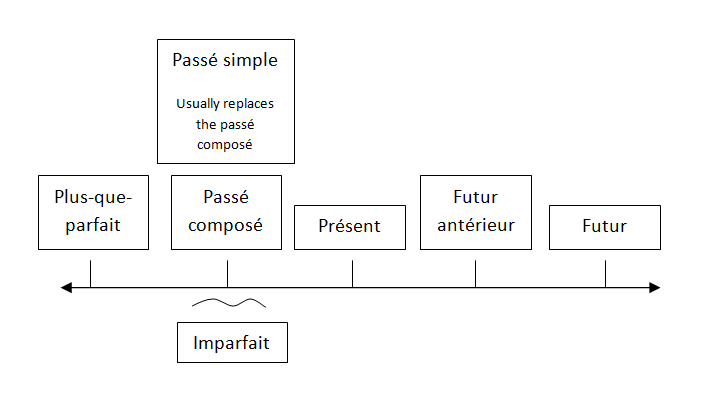Easy French grammar: in a tense mood
 Are you the type of person who hears ‘French grammar’, and runs? Then lock yourself in for the easiest and simplest grammar ride of your French learning career.
Are you the type of person who hears ‘French grammar’, and runs? Then lock yourself in for the easiest and simplest grammar ride of your French learning career.
There is nothing about French grammar that is hard, and I’ll tell you why. The language has rules and order, and we repeat these same steps every time we have to communicate so that other speakers can understand us. If language were random, no one would understand anyone.
Over the next articles in this series, ‘Easy French Grammar’, we will be exploring the simplicity of syntax, and the neat nuances that make the French language.
French verbs with an attitude
So, let’s get in the ‘mood’, with some mood and tense talk. The word ‘mood’ describes the main categories of verbal inflections that we use to express our attitude on a phrase. For example, the difference between using an imperative mood:
‘Pass me the cheese!’
and using the indicative mood: ‘He passed me the cheese’ – gives a very different ‘attitude’ to the expressed sentence.
Firstly, we will look closely at the indicative mood, as it is made up of many tenses which indicate when the action of the verb occurred:
- Le présent (present tense)
- Le futur simple (future tense)
- Le futur antérieur (future perfect)
- Le passé composé (simple past/present perfect)
- L’imparfait (imperfect/past progressive)
- Le plus-que-parfait (past perfect)
- Le passé simple et le passé antérieur : these are literary tenses and will be explained in a later post.
The less tense French
The English language is actually quite troubling, as it has many more tenses than French. Le présent, for example:
covers our present tense: ‘John eats a croissant’;
the present progressive: ‘John is eating a croissant’;
and the present emphatic: ‘John does eat a croissant’.
It does all this in the one phrase: John mange un croissant. How easy for us French learners!
This does not mean that you can always translate from English to French and get a perfect result! This is because the French think in time sequences, whereas in English, we don’t always consider this necessary, and leave it up to the listener to decipher when certain events occurred.
Let’s look at two events that occurred in the past:
1) Il a trouvé la grammaire française assez facile car il l’avait étudiée à l’école.
He found French grammar easy enough because he had studied it at school.
Leaving your troubles in the French past
In the above sentence, you can see that the event of ‘studying at school’ comes before the event of ‘finding grammar easy’. However, it is not always that simple, as in English we can just as easily say ‘because he studied it at school’, without indicating that the action occurred earlier.
A similar issue occurs when deciding whether to use le passé composé or l’imparfait. Just think of timing!
1) Il a trouvé la grammaire française assez facile, car il l’avait étudiée à l’école.
This means that at that particular or fixed moment, he found the grammar easy due to his school knowledge.
2) Il trouvait la grammaire française assez facile, car il l’avait étudiée à l’école.
This means that he always found French grammar rather easy, after studying it at school (it happened over a continuous period of time).
The important time sequencing is represented in this simple timeline:
Just remember to use the correct tense, and you will achieve the right result!
What do you find difficult concerning tense and mood? Share your problem areas of grammar gripes below!
All images supplied by Katerina Forrester.








It’s very interesting to see how foreigners see our language, thanks for this Katerina ! As a French person, I always thought that French tenses were quite hard and I admit that I sometimes make some mistakes myself haha